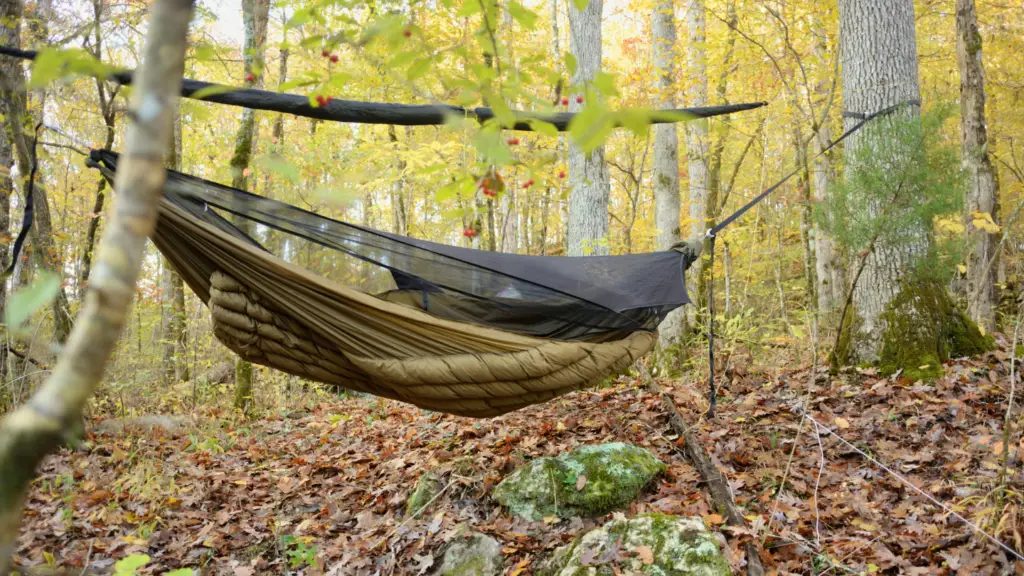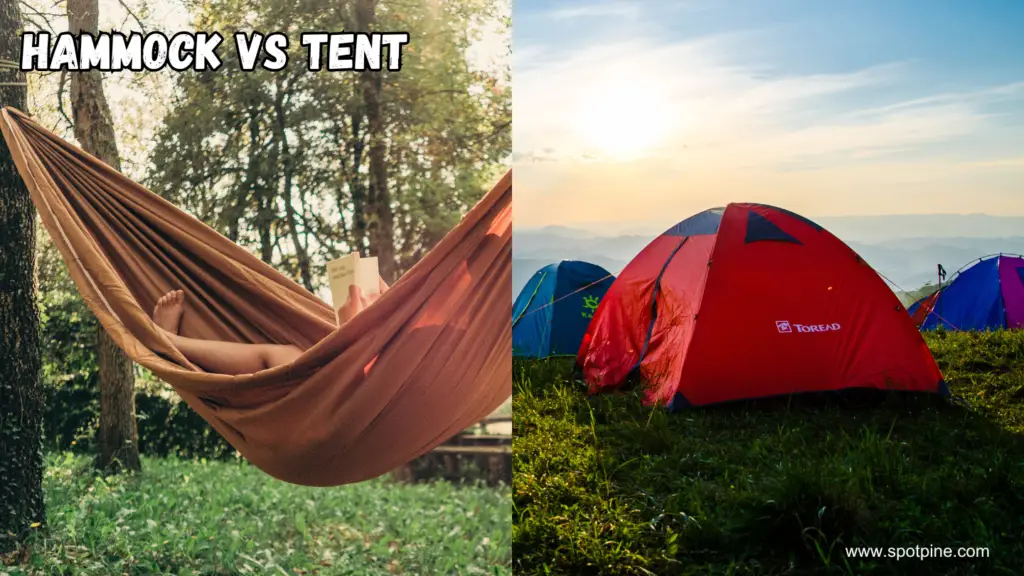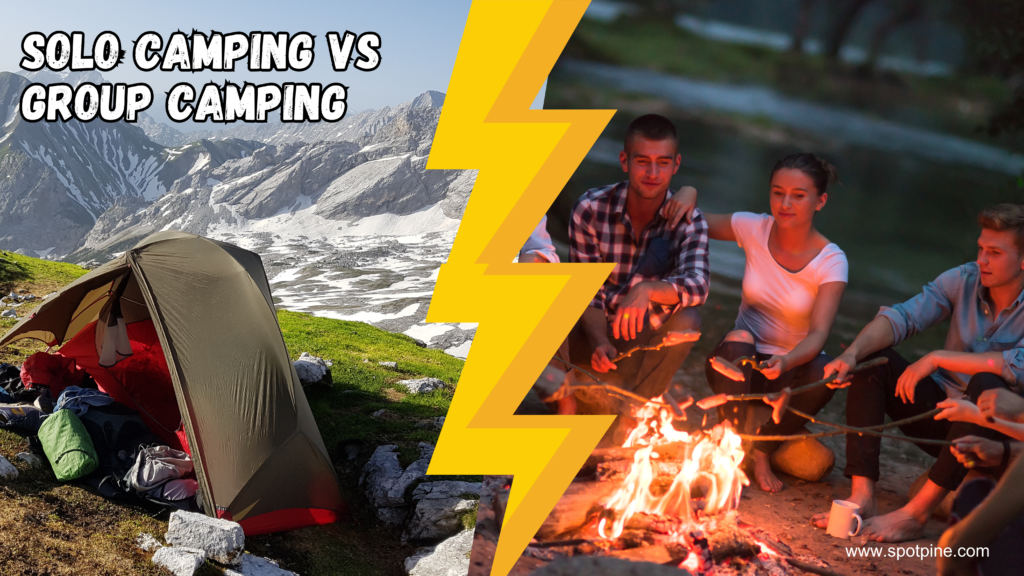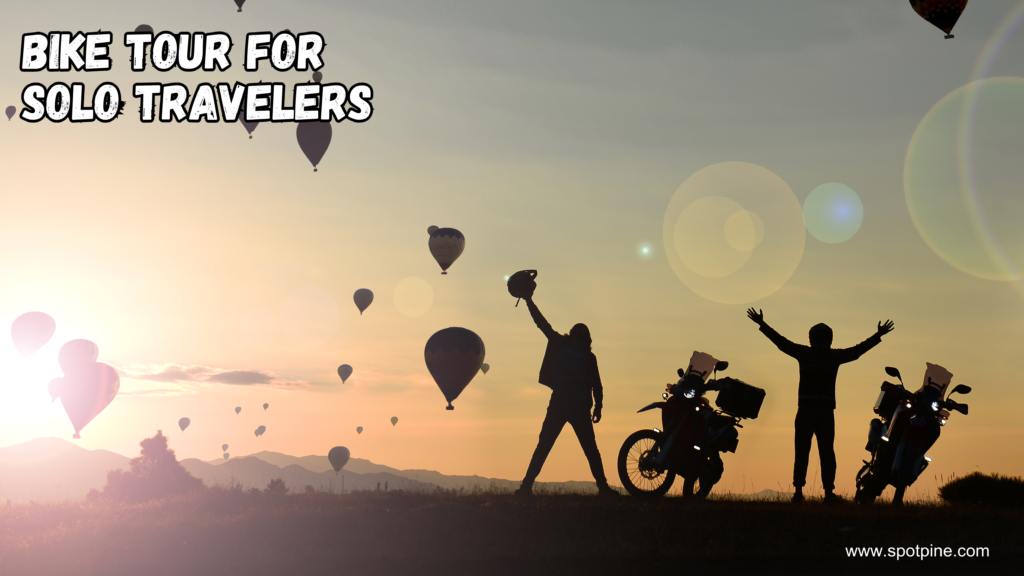A hammock is better than a tent for solo camping due to its increased suspension, providing greater comfort and cooler sleeping. However, tents offer better protection from weather and wildlife, making them more suitable for certain situations.
Choosing the best option depends on personal preference and the camper’s specific needs. For solo camping, the choice between a backpacking hammock and a tent can be a difficult one. A hammock provides greater comfort and cooler sleeping due to its increased suspension, whereas a tent offers better protection from weather and wildlife.
When making a decision, campers should consider their personal preferences and specific needs. Hammocks are lightweight and easy to set up, making them ideal for hikes. However, their lack of protection may not be suitable for extreme weather conditions. Tents offer better protection, but they are heavier and take longer to set up. Ultimately, the choice between a hammock and a tent for solo camping depends on the individual’s preferences and specific needs.
Pros And Cons Of Tent Camping
Backpacking hammocks and tents both have their advantages and disadvantages for solo camping. The hammock provides a more comfortable sleeping experience and is lighter to carry, but lacks privacy and can be difficult to set up. On the other hand, tents offer more protection from the elements and privacy but can be bulkier and heavier to carry.
Ultimately, the choice depends on personal preference and the type of camping being done.
When it comes to solo camping, one of the biggest decisions you have to make is whether to pack a hammock or a tent. Both options have their pros and cons, and it ultimately comes down to personal preference. In this blog post, we’ll focus on the pros and cons of tent camping, so you can make an informed decision.
Pros Of Tent Camping
– Shelter: Tents offer a protected and enclosed space that keeps you dry and safe from the elements. You’ll have a roof over your head, which can be particularly useful during rainy or windy weather. – Privacy: Another advantage of tents is the increased privacy they provide. You’ll have your own separate space to sleep, change, and store your gear. – Comfort: Tents offer a comfortable and level sleeping surface, which can be particularly beneficial for those with back problems. You’ll also have the option to use a sleeping pad or air mattress to increase comfort levels further. – Storage: Tents provide ample space to store your gear and keep it protected from the elements. You won’t have to worry about your backpack or gear getting wet or damaged during the night.
Cons Of Tent Camping
– Setup: Tents can be challenging to set up, particularly for first-time campers. You’ll need to make sure you have all the necessary equipment and expertise to set the tent up correctly, including finding an appropriate camping spot to pitch your tent. – Weight: Tents can be quite heavy and bulky, particularly if you’re carrying your gear on your back. This can be a disadvantage for hikers and backpackers looking to minimize the weight of their load. – Vulnerability: Tents can be vulnerable to damage from wildlife and harsh weather conditions. If you’re camping in an area known for bears or other potentially dangerous animals, you may want to take extra precautions to protect your tent. – Temperature: Tents can be hotter or colder than hammocks, depending on the material they’re made from. A tent can offer more warmth in cold weather, but it can also trap heat, making it uncomfortable during the summer months. In conclusion, tents offer a comfortable and enclosed space, with increased privacy and storage options. However, they can be challenging to set up, heavy to carry, vulnerable to damage, and uncomfortable in extreme temperatures. Consider your camping needs and preferences when deciding between a tent and a hammock for your next solo camping trip.
Pros And Cons Of Hammock Camping
When it comes to solo camping, hammocks and tents have their own set of pros and cons. Hammocks are lightweight, easy to set up, and provide elevated sleeping, but lack privacy and protection from weather. Tents offer more protection, privacy, and space, but can be bulky and challenging to set up.
when solo camping might prefer a single hammock. Weight capacity: Ensure that the hammock can safely support your weight. Accessories: Some hammocks come with mosquito nets, rain flies, and other useful additions.
Pros Of Hammock Camping
Elevated Sleeping:
Hammocks are raised off the ground, which can provide extra comfort and insulation from the cold. It also ensures you avoid rocky or uneven ground found at campsites.
Portability:
Hammocks are much lighter and easier to pack than tents. They take up less space and can be attached to the outside of a backpack.
Ease of Setup
: Hammocks are easy to set up and take down, requiring only trees or other sturdy anchor points for suspension.
Minimal Environmental Impact
: Hammocks does not require digging into the ground or making any structures that can disturb the environment.
Cons Of Hammock Camping
Privacy :
Hammocks are more exposed than tents, and campers may feel more visible or vulnerable to wildlife, insects, or other humans nearby.
Weather Limitations:
Hammocks can be uncomfortable in extreme temperatures or during heavy rain, wind, or snowfall. They also leave the camper more exposed to the elements, making it challenging to protect their belongings, especially if there is a lack of additional equipment such as mosquito nets or rainfly.
Weight Capacity :
Not all hammocks can support heavier people. Always check the weight limit of a hammock before purchasing.
Solo-Sleeping :
Hammocks are usually for single occupancy, but getting a double occupancy hammock may give you more space; however, it will require a larger shelter setup and take up more space in your backpack. In summary, hammock camping and tent camping both have their advantages and disadvantages; the best option depends on your personal preferences and circumstances. If you prefer a more lightweight setup that is easy to pack and set up, hammock camping might be the right choice for you. If you prioritize privacy and all-around weather protection, tent camping may be a better fit.
Factors To Consider When Choosing Between A Hammock And A Tent
When deciding between a hammock and a tent for solo camping, consider your comfort level, the type of terrain you will be camping on, and the weather conditions you may face. Hammocks offer a unique outdoor experience with their suspended sleeping platform, but tents provide more protection from the elements.
Ultimately, the decision comes down to personal preference and the demands of your camping trip.
Factors to Consider When Choosing Between a Hammock and a Tent Whether you’re an experienced camper or a novice, choosing between a hammock and a tent for solo camping can be a tough decision. Both have advantages and disadvantages and making the right choice largely depends on your personal preferences and camping needs. Some key factors to consider when making a decision include ease of setup, comfort, campsite selection, privacy, weather conditions, weight, and cost. H3: Ease of Setup Setting up a hammock is generally easier and quicker than setting up a tent. With a hammock, all you need are two sturdy anchor points, such as trees, and you’re good to go. Tents, on the other hand, require more space, time, and effort to set up, especially if you’re camping alone. However, if you’re not experienced in hammock camping, it might take some practice to master the art of setting up your hammock. H3: Comfort A hammock offers a unique level of comfort and relaxation that can be hard to beat. Unlike a tent, a hammock provides a gentle sway that can help soothe you to sleep and relieve stress. Additionally, sleeping in a hammock elevates your body, which can reduce pressure on your back and joints. However, if you’re not careful with your choice of hammock, you can end up feeling unstable and insecure. In contrast, a tent provides a more standard sleeping surface and can offer a level of peace of mind that a hammock doesn’t. H3: Campsite Selection Campsite selection is an essential factor to consider when deciding between a hammock and a tent. A hammock requires two sturdy trees or branches at the perfect distance apart, which might not always be available. If you can’t find trees in a suitable location, you’re out of luck. Additionally, a hammock won’t work well on rocky or uneven terrain. However, tents offer more flexibility since they can be pitched anywhere you can find a flat surface. Tents are also better suited for camping in areas with heavy rain and strong winds. H3: Privacy Privacy is another factor to consider when deciding between a hammock and a tent. Hammocks are open-air shelters that offer little privacy. If you’re camping in a crowded area or feeling uncomfortable with your surroundings, a hammock might not be the best option for you. In contrast, a tent offers complete privacy, allowing you to change your clothes, take a nap, or read a book comfortably. H3: Weather Conditions Weather conditions can greatly influence your choice between a hammock and a tent. A hammock doesn’t do well in extremely cold temperatures and can leave you exposed to the elements. Additionally, you’ll need to bring additional insulation to stay warm. Tents, on the other hand, offer better protection from the elements, but can also add extra weight to your backpack. Hammocks are generally lighter and more compact than tents, making them an excellent choice for backpackers who want to travel light. However, high-quality hammocks can be just as expensive as high-quality tents. Similarly, while tents tend to be heavier and bulkier, some ultralight tents can be just as lightweight as a hammock.
Why Some Prefer Tents Over Hammocks
Backpacking hammocks and tents are two popular camping shelters, but some people still prefer tents over hammocks because they provide more protection and privacy from the elements and wildlife. Tents also have more space to store gear and move around, making them ideal for solo camping.
When it comes to solo camping, choosing between a hammock or a tent can be a difficult decision. Each has its own pros and cons, and the right choice depends on your personal preferences. For some solo campers, the thought of sleeping in a hammock might not seem as appealing as sleeping in a tent. Let’s delve into why some prefer tents over hammocks.

More Warmth
When camping in cold weather, tents offer better insulation and warmth than hammocks. Tents trap body heat inside, which helps keep you warm on chilly nights. Hammocks, on the other hand, leave you exposed to the cold air from below. Even with an underquilt and sleeping bag, you may still feel the cold air seeping in. If warmth is a priority for you, then you may want to consider using a tent instead.
Better Rain Protection
When it rains, tents offer better rain protection than hammocks. Tents are designed to keep you dry and sheltered from the elements, while hammocks leave you exposed. Unless you have a tarp or rainfly, rain can easily get into a hammock. In contrast, tents protect you from the rain with waterproof materials and a solid roof. If you’re camping in a rainy area, a tent may be a better option.
Less Vulnerable To Damage
Tents are sturdier and less vulnerable to damage than hammocks. Tents can withstand strong winds and heavy rain, while hammocks may tear or rip in extreme weather conditions. Additionally, tents provide better protection from wildlife, such as bears and raccoons, which can easily damage a hammock. If you plan to camp in areas with harsh weather or wildlife, a tent may be a safer choice. In conclusion, while hammocks offer a unique experience and benefits such as increased comfort and less weight to carry, some solo campers prefer the warmth, rain protection, and sturdiness that tents provide. Ultimately, the decision between a hammock or a tent comes down to personal preference, camping location, and the weather conditions.
Why Some Prefer Hammocks Over Tents
For solo camping, many prefer hammocks over tents due to their comfort, weight and space-saving benefits. With a backpacking hammock, one can easily sleep under the stars, experience cool air and avoid setting up complicated structures.
When it comes to choosing between a backpacking hammock vs tent for solo camping, it’s important to weigh the pros and cons of each. While tents have long been the traditional option, there’s been a surge of interest in hammock camping in recent years. Many campers have found that hammocks offer certain advantages that tents simply can’t match. In this post, we’ll explore some of the reasons why some people prefer hammocks over tents for solo camping.

Lightweight And Compact
One of the biggest advantages of backpacking with a hammock is that it’s much lighter and more compact than a tent. When you’re carrying everything on your back, every ounce counts. Most hammocks can be packed down to the size of a grapefruit and weigh just a few pounds, whereas tents can be much bulkier and heavier. This means that hammocks can be an excellent choice for long-distance hikers or anyone who wants to travel light.
No Uncomfortable Ground To Sleep On
One of the most common complaints about tent camping is that it can be uncomfortable to sleep on the hard ground. Even with a thick sleeping pad, it can be difficult to get a good night’s sleep in a tent. With a hammock, on the other hand, you’re suspended off the ground, which means you don’t have to worry about rocks, roots, or other hard objects poking you in the back all night. This can lead to a much more comfortable and restful sleep.
Increased Suspension
Another advantage of a hammock over a tent is that it increases suspension. Because the hammock is suspended, it can sway slightly in response to the wind, which can be a pleasant sensation. Additionally, the suspension can make it easier to sleep if you’re in an area with uneven terrain.
Better For Hot Weather
If you’re camping in hot weather, a hammock can be a great choice. Sleeping in a tent in the heat can be uncomfortable, as tents can trap heat and become stuffy. With a hammock, you’re suspended in the air, which means you can benefit from any breeze that comes your way. This can help keep you cool and comfortable even on hot nights. Overall, the choice between a backpacking hammock vs tent for solo camping is a personal one. Both options have their advantages and disadvantages, and the best choice will depend on your individual needs and preferences. If you’re looking for a lightweight, compact, and comfortable option for solo camping, a hammock may be the way to go.
Conclusion
The decision to choose a backpacking hammock or a tent for solo camping ultimately comes down to personal preference. While tents offer more privacy and protection from weather conditions, hammocks provide a comfortable and unique sleeping experience. Both options have their advantages and disadvantages, so it is essential to evaluate your needs and choose what works best for you.
Whichever you decide, make sure to prioritize safety, comfort, and durability for an enjoyable outdoor experience.



